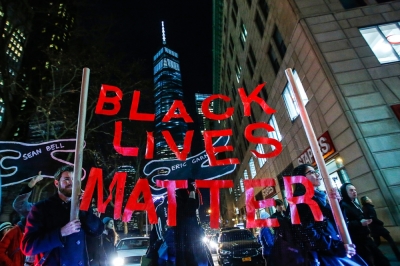MLK vs. BLM: 3 big differences

There was a moment in time about two weeks ago when we could have come together; when we could have united in common purpose and begun healing old wounds. When the video of George Floyd’s murder went public, we were a nation united in righteous anger at the stunning abuse of police power. The depraved and arbitrary killing of an American citizen by a power-drunk rogue cop acting under the color of law brought about instant and uniform condemnation. But before people of good will could seize the moment, it was stolen away. It was stolen away by a group of entitled, self-interested anarchists who see chaos as opportunity, and whose currency is mob violence.
As if that’s not bad enough, as they go about their orgy of destruction these hooligan anarchists are trying to claim the twin mantles of social justice and civil rights. It’s disgusting. Not only is it criminal and counterproductive, but it does violence to the legacy of the true titans of social justice who came before. The roving bands of hate-fueled destroyers rampaging through American cities are ripping out the very soul of their own movement. They are dismantling the legacy of their righteous brothers and sisters who, 50 years ago, put their lives on the line for a truly noble cause and changed the course of American history. Though the BLM and Antifa mobsters claim the mantle of Dr. King and the civil rights movement, the differences between them could not be starker. Everything else aside, there are three big differences between the civil rights movement of the 1960s and today’s activists: facts, moral authority and goals.
1. Facts – In 1960s America there was a common set of facts everyone agreed on. At issue was not the facts themselves but whether they were good or bad. Institutional racism back then was a concrete thing. It was enshrined in law. In the Jim Crow south segregation was real. Blacks and whites went to different schools, shopped in different places and lived in different neighborhoods. And those separate living and working conditions, although deemed “equal” under the law, were anything but, and everybody knew it. Unlike today where we see a similar result but can argue over the cause, there was no question of causation back then. Blacks and whites were separate because state laws, sanctioned by the United States Supreme Court, made them separate. The law, in a real and authoritative way declared that black people were less than white people. The argument back then wasn’t over whether systematic racism existed, it absolutely did. The question was whether that racism was morally acceptable. The answer of course was, and remains, no.
Today’s argument over racism is not nearly so clear cut. The law, both federal and state, has been fixed. Jim Crow laws were repealed or annulled by the courts, federal anti-discrimination statutes were enacted, and racist Supreme Court precedents were overturned. In a legal sense all Americans, whatever color they may be, are finally equal before the law. To the extent there are still differences in living and working conditions between races, causation is a major question. If the law says everyone is equal, what causes the disparity? That question of fact makes today’s arguments about racism a different kind than we saw in the '60s. Today’s conversation contemplates such ineffable concepts as white privilege, intersectionalism, micro-aggressions and latent racism. Those concepts are so inherently accusatory and divisive that people of good will can’t even agree on whether they are real. That inability to define the underlying problem has been seized upon by modern “activists” as manifest proof of racism and justification for destructive mob violence. It’s a self-fulfilling prophecy, and it is absurd. Who can take seriously an argument that posits a person is guilty of racism by virtue of existing even if they have never engaged in racist language or practice? Under such an analysis it comes as little surprise that race relations are deteriorating even as the nation, prior to COVID-19 at least, is experiencing a period of unprecedented economic growth and prosperity across all ethnic groups.
2. Moral authority – The second, and perhaps biggest difference between the 1960s civil rights movement and today’s BLM and Antifa activists is the moral authority from which they operate. Dr. King was a devout and serious Christian. His activism found its roots not in identity politics but in scripture. Dr. King took the Bible seriously, and he saw the inherent contradiction between God’s moral code and the state-sanctioned discrimination codified in law. He believed in the idea that all men are created equal and that we are all image-bearers of almighty God. More importantly he knew that he could appeal to the shared morality of a body politick that mostly agreed with him. The America of the 1960s was still a place that adhered to a predominantly Christian social and moral ethic. That’s not to say that everyone was a practicing Christian, but the overwhelming social mores of the day were rooted in biblical Christianity.
Dr. King knew that racism was contrary to biblical teaching, and he knew that he could make that argument to a country that would listen. It is true that some churches and sects in the Jim Crow south cherry-picked and perverted the holy scripture to justify continued subjection of black people. But it is equally true that an honest reading of scripture is incompatible with race-based segregation, Dr. King knew that. He also knew that inherent to Christianity were the tools to confront and end the abhorrent practice carried out, too often, in its name. Dr. King called on Christians to live up to biblical ideals because he knew scripture was on his side. He was effective because 50 years ago most people still believed that God was the source of moral authority and when faced with the contradictions pointed out by King, they knew he was right. That’s why his movement was so overwhelmingly effective at changing not only laws, but hearts. That entire framework is absent in today’s BLM/Antifa movement.
Today, the Christian ethics of transcendent morality and creator-endowed equality have been replaced by a progressive notion of radical secular humanism. As the extreme left has made deeper and deeper inroads into education, law and entertainment, it has systematically advanced its notions of subjective morality and fundamental self-autonomy. And because they’ve been so successful, there is no longer an objective moral order to which they can appeal. Morality has been reduced to vacuous platitudes and virtue signaling on social media. Accountability to almighty God has been replaced with accountability to whatever makes you feel good. “You do you” the saying goes. And if “me doing me” manifests itself in hurling Molotov cocktails, destroying businesses and killing cops, so be it. The problem is, who’s going to be compelled by that kind of nonsense? More importantly, under that type of subjective moral framework, what warrant do BLM and Antifa have for claiming they are being wronged in the first place?
Dr. King practiced non-violence not because he wasn’t angry, but because he knew if he didn’t, he would lose his moral mandate. His recognition of, and reliance upon, God’s transcendent moral order made all the difference in the world. It’s is what sets him apart from today’s rampaging activists, and it’s what made him the greatest civil rights leader in American history.
3. Goals – The final difference between the 1960s civil rights movement and today’s is the existence of a concrete objective. With Dr. King, it was clear. The main-line civil rights activists of the '60s wanted defined changes. They wanted full equality before the law, equal protection under the law, and an end to legally prescribed segregation. With the Civil Rights Acts of 1964 and 1968, along with a slew of Supreme Court decisions, they got it. In that sense at least it was “mission accomplished,” and the world was a better place because of it.
The aims of the modern civil rights movement aren’t nearly so distinct. As far as I can tell they seem to want an end to “racism,” but it’s not at all clear what that means. The Black Lives Matter movement itself is schizophrenic on the subject. On the one hand it claims to be against racism (i.e. making value judgments based on skin tone), on the other it routinely, and aggressively, denounces the phrase “all lives matter” (i.e. everyone is of equal value regardless of skin tone) as racist. That type of cognitive dissonance is unsustainable. It’s also disingenuous. The same problem exists with Antifa. Antifa claims to be against fascism, and then turns around and desecrates a WWII memorial that was erected for the sole purpose of memorializing men and women who died fighting fascism! It’s nonsensical.
The fact is, the modern civil rights movement has been so badly co-opted and polluted by the radical politics of the intersectional left that it’s almost unrecognizable. From the outside looking in, it doesn’t seem to be about racism at all. It looks like run-of-the-mill liberal politics, and that's too bad. Because if the goal is to improve policing practices and strengthen use-of-force laws to drum serial abusers out of the force, I’m all in. But if supporting that also means I must sign on to the entire progressive agenda (e.g. immigration, environmentalism, abortion, wealth redistribution, etc.) just to prove I’m not a racist, then I’m out. The lack of clearly defined objectives and the conflation with other so-called social justice causes is doing untold damage to an otherwise noble cause. And demonstrations devolving into riots isn’t helping either.
Dr. King understood this dynamic. That’s why he distanced himself from groups like the Black Panthers and the Nation of Islam. He knew he couldn’t build a coalition for change by adopting the fringe policies and ill-defined goals of the radical left. King built a broad and unstoppable movement because he set clear goals, stayed on message and didn’t needlessly alienate potential allies. Today’s young activists should sit up and take notice.
By day Jay Atkins works as a Government Affairs attorney for a California-based technology company. By night he is a lay author and Christian apologist. He thinks and writes about proofs for faith and how they intersect, or should intersect, with public policy.



























